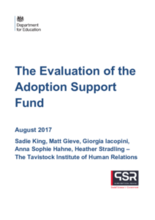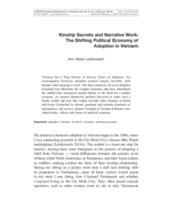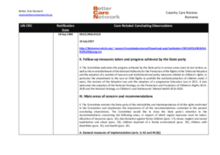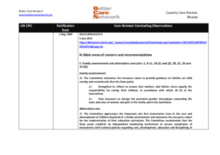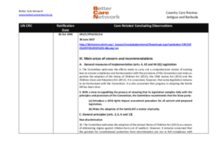Displaying 351 - 360 of 660
This report presents the findings of an evaluation of the UK's Adoption Support Fund undertaken by the Tavistock Institute of Human Relations.
This study investigated how adoptive and prospective adoptive parents in Spain deal with signs of fraud and corruption within the intercountry adoption process, illuminating the dismissal of the systemic failures of intercountry adoption and the rights of birth families.
This article draws from three narratives of secret adoptions in Vietnam to further examine and analyze the complex nature and practices of domestic adoption in the country.
This study explores whether child and family-related factors are associated with later psychological problems in international adoptees in Finland. Researchers then investigated whether the length of time a child spends at home after adoption and before daycare moderates the aforementioned associations.
This country care review includes the care-related Concluding Observations adopted by the Committee on the Rights of the Child during the seventy-fifth session (15 May 2017 - 02 Jun 2017) of the Convention on the Rights of the Child.
This country care review includes the care-related Concluding Observations adopted by the Committee on the Rights of the Child during the seventy-fifth session (15 May 2017 - 2 Jun 2017) of the Convention on the Rights of the Child.
This country care review includes the care-related Concluding Observations adopted by the Committee on the Rights of the Child during the seventy-fifth session (15 May 2017 - 02 Jun 2017) of the Convention on the Rights of the Child.
This country care review includes the care-related Concluding Observations adopted by the Committee on the Rights of the Child during the seventy-fifth session (15 May 2017 - 2 Jun 2017) of the Convention on the Rights of the Child.
The goal of this study is to analyze, from the adoptee's point of view, the experience of being adopted in the school context and the impact of the child's social competence, social disclosure of adoption and social reaction to the adoptive status.
This country care review includes the care-related Concluding Observations adopted by the Committee on the Rights of the Child during the seventy-fifth session (15 May 2017 - 2 Jun 2017) of the Convention on the Rights of the Child.

